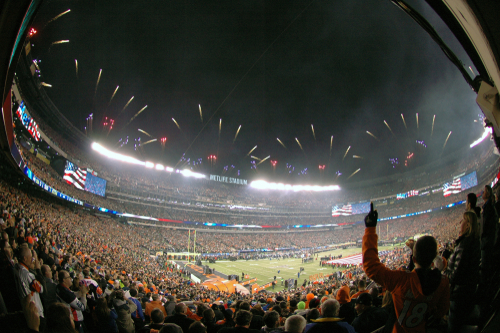The National Center for Spectator Sports Safety and Security (NCS4) at the University of Southern Mississippi (USM) conducted an online survey in April/May 2022 to explore professional sports venue security issues, emerging threats, and technology solutions.
A total of 40 venue directors hosting teams from Major League Baseball (MLB), Major League Soccer (MLS), the National Basketball Association (NBA), the National Football League (NFL), and the National Hockey League (NHL) completed the survey. Staffing and training, fan behavior, technology utilization, patron screening, cybersecurity, and drone mitigation were areas of focus.
Most venues contract with a third party for security staff and require background checks on contracted and full-time staff. Many experienced staffing shortages in the last two years, and 70% of respondents indicated that staff absenteeism increased since the beginning of the COVID-19 pandemic. To mitigate staffing shortages, venue security directors increased the hourly wage, provided complimentary food, offered discounted tickets, provided close parking to the venue, hosted staff family events at the venue, and provided complimentary merchandise.
Top training requirements for security staff included venue/event familiarization, prohibited items, fan code of conduct, standard operating procedures, how to operate security technology, and crowd management. Facilitated in-person training was the most common method, followed by table-top exercises, routine refresher courses, e-learning, and workshops.
Most respondents believe fan behavior is worse than it was 10 years ago, and 65% indicated that COVID-19 restrictions caused increased tension between patrons and staff. The most common forms of inappropriate fan behavior were alcohol abuse, fights between patrons, property damage, and violence against staff members. The most concerning behaviors were fights between patrons, violence against staff members, and the use of weapons.
All respondents enforce a spectator ejection policy at their venue, and the policy is communicated through various means, such as venue/event website, signage, video boards, public address announcements, tickets, venue/event app, email, and social media.
Crowd management strategies employed by venue directors included an alcohol policy, signage, announcements, barriers, staff directing crowd movement, designated entry times, staggered entry times, and Radio Frequency Identification (RFID) tags/apps.
Technology can bolster safety and security efforts when budgets permit acquisition. Closed-circuit television, walk-through metal detectors, electronic tickets, stationary bollards, explosive detection canines, and venue signage were utilized by 100% of the respondents. Facial recognition software, license plate readers, retractable bollards, automated barrier systems, and RFID for staff were most likely to be purchased if additional funding was available.
The majority of respondents indicated that their current entry screening checkpoints caused lines to form outside their venues, and the average wait time is less than 10 minutes during the busiest times. Approximately one-third of respondents experienced security incidents between patrons waiting to enter the venue. Most respondents (87%) use patron screening technology, including walk-through metal detectors, handheld magnetometers, and x-ray scanners.
Ideally, venue directors want to get patrons inside the venue faster without sacrificing prohibited item detection accuracy. If respondents were able to acquire new screening technology, they would likely purchase facial recognition systems, followed by millimeter wave scanners and explosive particle detectors.
Only 20% of respondents use artificial intelligence in their security screening, surveillance, or incident response technology. However, 62.5% believe they understand how artificial intelligence can help their security operations.
Most respondents have implemented a cybersecurity defense program and provided basic cybersecurity awareness training to full-time staff. In addition, patrons are informed of the secure in-house WiFi networks to use at their venues.
Recreational drone usage has increased significantly over the past several years, and these unmanned aircraft systems (UAS) may present problems if near or above event spaces. The majority of respondents have a drone mitigation plan, and 82.5% observed or detected unauthorized drone operations in the airspace around their venues. Event operations were interrupted on a few occasions, with one instance when an evacuation or protective action was required.
Recommendations
The NCS4 provided the following industry recommendations and resources:
- Conduct a background check on all staff, especially those with access to restricted areas or privy to sensitive information.
- Require de-escalation, crowd management, and active shooter training for event staff, and provide basic cyber hygiene training for staff with access to cyber infrastructure.
- Engage with TEAM Coalition or TIPS for alcohol management training and responsible consumer campaigns.
- Offer in-person staff training supplemented by e-learning programs. Virtual platforms, such as Zoom, can also be leveraged.
- Explore incentives for security staff to increase hiring and retention numbers (e.g., referral programs).
- Clearly communicate venue and spectator policies (e.g., fan code of conduct, ejection policy) before arrival at the venue.
- Encourage or incentivize early spectator entry to events.
- Promote responsible behavior through dedicated campaigns with the support of venue/event management, governing bodies, and participants.
- Explore technology options that best fit operational needs and budgets.
- Consider artificial intelligence capabilities that can add value to venue security systems.
- Implement a drone mitigation program and work with local/state authorities on drone intrusion response procedures. Consider using drone detection technology.
- Utilize incident data, research, and industry resources to inform plans, policies, and procedures.
- Review security and training resources provided by professional associations, government agencies, and academic entities, such as ASIS International, Cybersecurity and Infrastructure Security Agency (CISA), Event Safety Alliance (ESA), Federal Bureau of Investigation (FBI), International Association of Venue Managers (IAVM), NCS4, Stadium Managers Association (SMA), and the Security Industry Association (SIA).
The full industry report is available for download here.
Dr. Stacey A. Hall is the Executive Director and Professor of Sport Management and Dr. Joslyn Zale is Senior Research Associate at the National Center for Spectator Sports Safety and Security. NCS4 is an academic center housed at the University of Southern Mississippi and partially underwritten by grants from the U.S. Department of Homeland Security and the Federal Emergency Management Agency.

